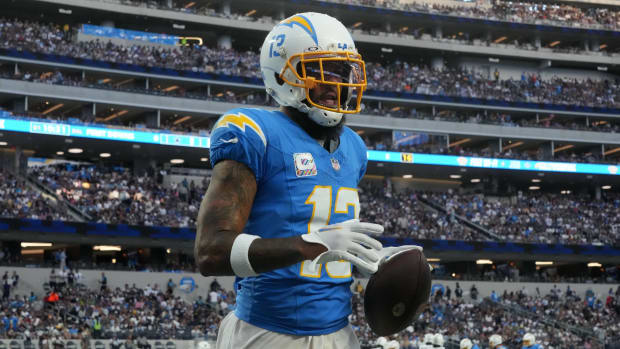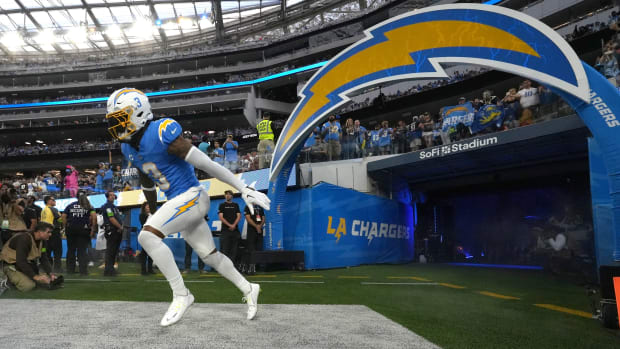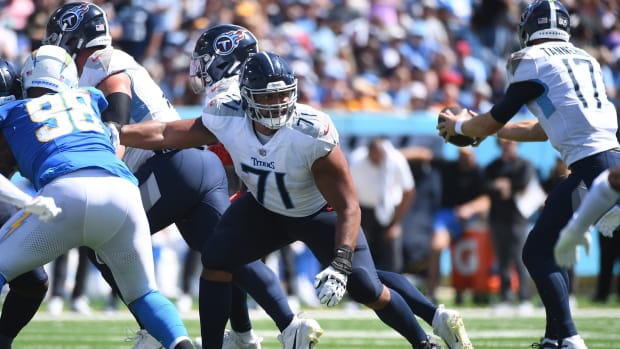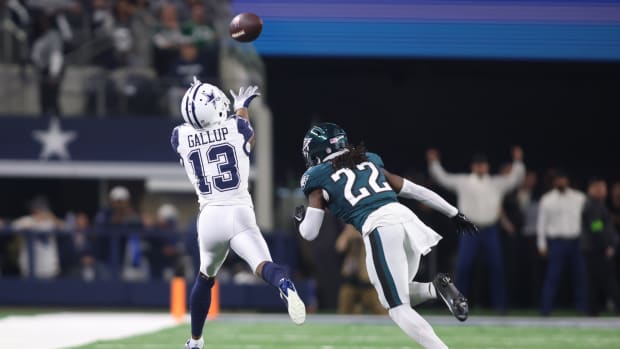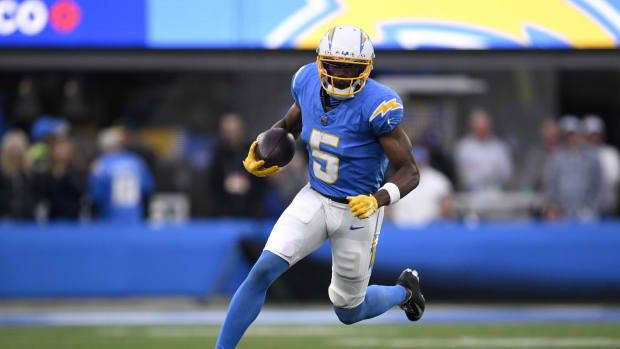Chargers' Remaining Needs After First Wave of Free Agency
The first wave of free agency has come and gone. With it, most of the big names available on the open market have found new homes or agreed to new deals with their previous teams, shifting the balance of power in the NFL in the process.
The Los Angeles Chargers saw plenty of action during free agency's first week even if they failed to lure superstar quarterback Tom Brady to the West Coast. General manager Tom Telesco and his staff managed to land offensive tackle Bryan Bulaga, cornerback Chris Harris Jr., and nose tackle Linval Joseph, filling holes and adding talent throughout the roster. Los Angeles also made its trade for the Carolina Panthers' Trai Turner official, adding a young, five-time Pro Bowl guard to the offensive line.
At the same time, longtime defensive back and special-teamer Adrian Phillips, running back Melvin Gordon, and fullback Derek Watt all left for opportunities elsewhere, creating needs for the Chargers to address as the offseason continues. As part of the Turner trade, they sent away Russell Okung, a former Pro Bowler and the team's most reliable offensive tackle. These departures came on top of those previously announced for quarterback Philip Rivers, linebacker Thomas Davis, and defensive lineman Brandon Mebane.
Though Los Angeles has fewer holes now than it did when free agency began, several areas of the roster still require attention before the start of the 2020 season.
Quarterback
After Brady opted to sign with the Tampa Bay Buccaneers, the Chargers pivoted to a different plan. Rather than pursue a different signal-caller in free agency or via trade, the team instead chose to ride with returning veteran Tyrod Taylor and look to the draft for its next franchise quarterback.
That, of course, means the Chargers don't currently plan to make a major move at the position before the 2020 NFL Draft kicks off on April 23.
Whether the front office actually uses the upcoming draft to address their future behind center remains to be seen. After LSU's Joe Burrow, whom most expect the Cincinnati Bengals to take with the No. 1 overall selection, the Chargers have a few viable options to consider at the sixth pick. If the team feels strongly that Taylor can hold down the quarterback position for 2020, taking Alabama's Tua Tagovailoa makes a lot of sense. Tagovailoa's recovery from a severe hip dislocation and the time missed because of it could force him to take a "redshirt" year. That risk could scare some potential suitors, putting Los Angeles in position to benefit.
If Tagovailoa goes earlier or the Chargers don't feel comfortable with his medical or football evaluation, they have other options. Oregon's Justin Herbert possesses prototypical size and arm strength for the position as well as abundant athleticism, making him a fit for head coach Anthony Lynn's offense. Still, Herbert's game appears to need fine-tuning before a team can expect him to start. The same applies to Utah State's Jordan Love, who might have the largest disparity between ceiling and floor.
Wide receiver
Keenan Allen and Mike Williams make up one of the NFL's premier wideout tandems. That doesn't mean they can carry the passing game by themselves, however. The Chargers could have used a receiver with top-end speed to open up the offense last season, especially after veteran Travis Benjamin landed on injured reserve with hip and quad issues.
As free agency wears on, the demands of the remaining wideouts will lessen. If the Chargers continue to wait out the market, they might find some value at an area of need.
Two free-agent wideouts with legitimate deep speed have yet to strike deals: Robby Anderson and Breshad Perriman. Anderson expressed interest in re-signing with the New York Jets prior to the start of free agency but either his asking price or the team's desire to pursue other players has pushed that discussion to the back burner. As for Perriman, he likely won't command as much in salary and could sign a one- or two-year deal for a reasonable price.
Offensive line
The swap of left tackle Okung for Turner should prove to be a net positive for the Chargers, and the addition of Bulaga addresses a longtime weakness for the offensive line.
However, the unit still carries concerns after the first wave of free agency. With Okung moving onto Carolina, the Chargers have no established replacement at left tackle. Bulaga has played the position at times in the past, but he will most likely line up at right tackle in Los Angeles. That leaves Trey Pipkins (a third-round pick from 2019) and Trent Scott (a returning exclusive-rights free agent) as the top in-house options. While the team has expressed confidence in both, neither possesses an ideal track record at left tackle.
Fortunately for the Chargers, the veteran market still has at least one viable option to consider. Longtime Philadelphia Eagles left tackle Jason Peters has yet to sign a deal and might consider moving out west for the right opportunity. Peters' age (38) and injury history (Achilles tear, knee reconstruction) have dampened his market, but he could still work as a stopgap option if Los Angeles doesn't believe Pipkins or Scott is ready for the full-time job.
But the Chargers offensive line has other issues as well. The center position remains in flux as Mike Pouncey awaits medical clearance to continue his career. The Pro Bowl lineman suffered a season-ending neck injury in Week 5 of last season and, though he intends to continue playing, doesn't yet know whether he can. If Pouncey doesn't return, guard Dan Feeney will most likely shift to center, opening a hole elsewhere.
Should that happen, the Chargers could look outside free agency to address the need. The Green Bay Packers could save over $4 million by trading former starting guard Lane Taylor, a former pupil of new Los Angeles' O-line coach James Campen. Adding Taylor for a late-round pick would more easily allow Feeney to shift over to center and provide valuable depth if Pouncey does play again.
Linebacker
Drue Tranquill, the team's fourth-round pick from a year ago, emerged as a potential long-term starter and special-teams maven over the course of his rookie season. Beyond him, the Chargers have few reliable pieces at linebacker after releasing Davis earlier in March. Meanwhile, they restructured Denzel Perryman's contract, a sign that his time with the team could come to a close after 2020.
Though the top free-agent linebackers like Cory Littleton, Blake Martinez, and Joe Schobert have already agreed to contracts, the market still has some options which could intrigue the Chargers. Patrick Onwuasor, who spent the first four seasons of his career with the Baltimore Ravens, has started 32 games and offers solid (albeit unspectacular) play. The Ravens appear to have interest in bringing him back, so the price might prove too inhibiting for Los Angeles if a bidding war breaks out.
Veteran Mark Barron could also garner consideration. A versatile player, Barron has worked primarily as an overhang defender specializing in pass coverage. Given the division in which the Chargers play -- more specifically the two annual matchups with Patrick Mahomes and the Kansas City Chiefs -- adding another athletic presence in the middle of the defense could prove highly valuable.
-- Jason B. Hirschhorn is an award-winning sports journalist and Pro Football Writers of America member. Follow him on Twitter: @by_JBH
